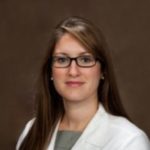Dr. Laura Hetzler specializes in Facial Plastics and Reconstructive Surgery as well as Otolaryngology, Head and Neck Surgery at Mary Bird Perkins – Our Lady of the Lake Cancer Center. She has studied how quality of life decreases after facial paralysis. With a passion for facial nerve recovery and reanimation, she seeks to understand the complexity of an individual’s smile and bring it back to life following a cancer surgery. “Facial expressions are the thumbprint of our personality,” she said. “Nonverbal cues are so important, and when they change, it’s devastating.”
Dr. Hetzler’s passion led to an idea – Understanding Smile Patterns and Enhancing Smile Outcomes with Facial Nerve Recovery – which won the 2021 Favre Family Award for Innovation. The annual award, spearheaded in 2016 by a generous donation from philanthropist Art Favre, encourages Mary Bird Perkins – Our Lady of the Lake Cancer Center team members to cultivate their creativity and submit their ideas for ground-breaking solutions to benefit patients served throughout the Gulf South region. Each grant proposal competes for a $15,000 award to bring the idea to fruition.
Dr. Hetzler’s project will help change the standard of care for facial paralysis sometimes caused by cancer surgery. In current treatments, Botox is commonly used to restore facial symmetry by paralyzing the overactive muscles in the face and allowing them to be retrained for proper movement; or by guiding physicians as to where to perform surgery on the affected nerves for restoring movement. A more thorough diagnostic process could have tremendous positive impacts, which is why Dr. Hetzler proposed the use of electromyography (EMG), the recording of the electrical activity of muscle tissue, to measure facial nerve stimulation and muscle response.
“As a surgeon specializing in these muscles, it’s possible to push further knowing certain things about the motions and muscle movement,” Dr. Hetzler said. “Having EMG technology will further refine recovery and make outcomes more reliable by comparing the paralyzed side to the normal side.”
The use of EMG will provide the ability to isolate out specific muscle groups in the face, as well as help understand whether or not intricate muscles are functioning effectively or abnormally in an effort to treat patients with facial paralysis more accurately. The award will fund the appropriate equipment for Dr. Hetzler and her clinic’s physical nerve therapist, Sara MacDowell, to study the facial nerves on a more nuanced and refined level.
With the advanced technology, Dr. Hetzler said it will also be possible to provide new treatments for patients previously affected, even decades ago. She is excited to move the project forward and said it could have a significant impact for the Cancer Center patients. “Nobody else is looking at facial nerves on this granular level; so closely and so thoroughly. It will be very significant and really help bring Mary Bird Perkins – Our Lady of the Lake Cancer Center to the forefront on a national scale,” she said. Dr. Hetzler hopes this technology will be the new standard of care within six to 12 months.
Dr. Hetzler encourages other staff members to take a chance on their own curiosity and propose their ideas. “If there is a question you are continually asking yourself in your role, decide if there is a way it can be answered and dream big,” she said. “We must continually ask ourselves how we can be better.”
Photos depict a patient’s recovered smile after facial paralysis due to hemorrhagic chondrosarcoma (cancer) at her skull base. After facial nerve reconstruction, botox was used to treat excessive muscle recovery, helping override the muscles and nerves causing abnormal motion. The process of choosing which nerves and muscles to treat is based on the treating physician’s knowledge of the facial muscles and patient’s specific symptoms. New EMG technology would eliminate any guesswork and allow confirmation of the exact muscles and nerves needing treatment, allowing for more accurate recovery and facial symmetry.
All Mary Bird Perkins Cancer Center team members are eligible and encouraged to submit their innovative ideas. Learn more about the Favre Family Award for Innovation and submit your idea at https://marybird.org/olol/favre-award/.

